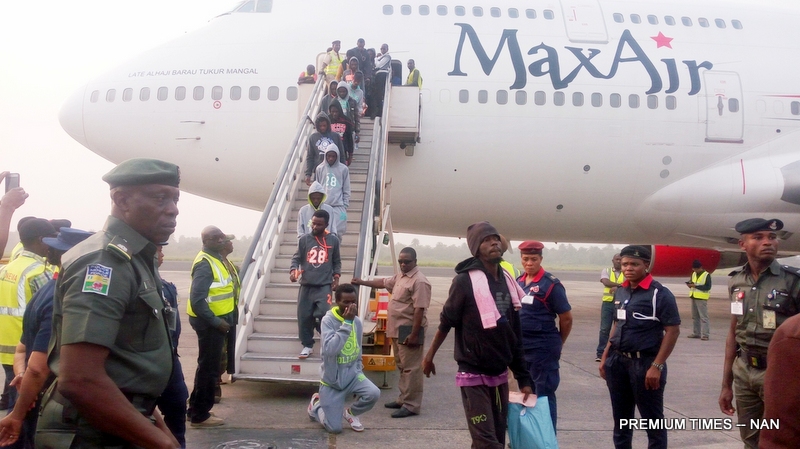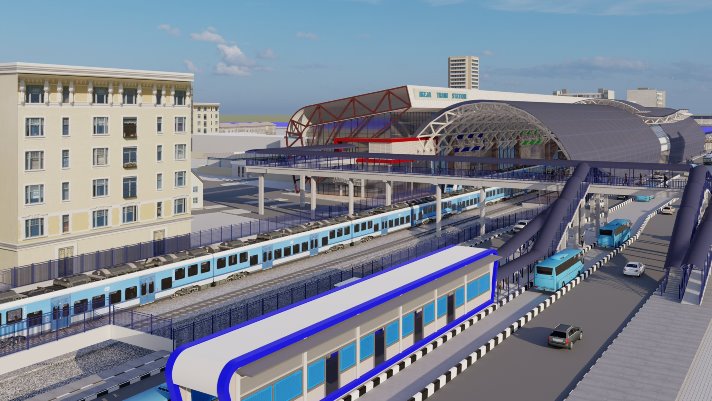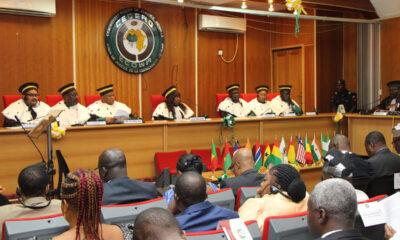metro
‘We begged women to urinate for us to drink to stay alive’

- Illegal emigrant narrates deadly experience in desert while trying to move to Europe
- Sight of Mediterranean sea forced me to cancel trip to Italy
Twenty two years after walking through the valley of the shadow of death, in search of greener pastures, Stephen Onyekamma has remained terrified. Unlike those who by faith would confess they fear no evil when confronted with such pangs of death, reliving of his experience still sends shivers down the spines of Onyekamma.
As he narrated his experience in the sahara desert to Saturday Vanguard, Onyekamma would intermittently pause out of traumatic effect and in thanksgiving to God for sparing his life. Initially, he was reluctant about recounting the experience, as he insisted it was one he wouldn’t want to remember. But upon insistence by our correspondent, Onyekamma buckled.
Journey to Libya
Six years after graduating from the Imo State University (IMSU), and after failed attempts to secure a job, Onyekamma decided to get out of Nigeria. That was in 1999. The graduate of Political Science had Italy as his destination country. Rather than following the right process of seeking visa into the European destination, he opted to go through the desert.
From Owerri, Onyekamma moved to Kebbi State and from Kebbi to Niger Republic. According to him, Niger Republic was a converging ground for those seeking to smuggle themselves into Europe through the desert. Unfortunately for the young graduate, he arrived Niger Republic in 1999 at a time he said the country was thrown into turmoil due to a coup d’ etat in which the country’s president was killed. Though he said he was aware of the coup, that however, could not deter him as he was desperate to hit the deadly desert. Waiting for the political unrest in Niger to subside could be a dream killer for him. Onyekamma therefore, resolved to weather the storm.
“After my graduation, I searched for job but couldn’t get. After six years, I decided to travel to Europe through the desert. My plan was to get to Libya, work a little and then move through the Mediterranean Sea to Italy.
“Before I left in 1999, I knew there was a coup in Niger, but I couldn’t wait, since I had already made up my mind to travel”.
Robbed in Niger
Onyekamma had undergone tutelage on how one could safeguard his money while in the desert. According to him, there were three available options – hiding the money in the collar of one’s dress while making the dress, or opening the heel of a shoe to conceal it. The third option was to tie the money in a nylon and swallow it, with the hope of excreting it during the call of nature. All of these options however, could not save Onyekamma. While in Niger Republic trying to board a Libya bound vehicle, he ran into rebels who he said had seized control of part of the country. They stripped him of his belongings, forcing him to return to the capital city of Niger. The rebels had mastered the modus operandi of the emigrants.
“The first setback I had was being robbed by rebels in Niger. I hid my money in the collar of my shirt, but the fear of being killed would even make one to surrender the money willingly. Having lost all I had, I returned to the capital city to restrategize. I was in Niger for about two years to raise some money before I took off again”.
Read Also: https://newstrends.ng/2021/10/16/competence-not-zone-should-determine-next-presidents-choice-bakare/
Experience in the desert
Those who navigate through the desert do their best to get well equipped for the deadly journey. While water and snacks are desideratum, the transporters also go with mechanics, should the vehicle break down in the desert. However, there are very dreadful situations in which a vehicle that developed fault in the desert would require changing some parts.
This could be the most traumatizing fate that could befall anyone travelling through the desert. When such happens, Onyekamma said the driver and his crew would abandon the emigrants in the desert and make their way back to Niger with a promise of returning with the vehicle parts. In some cases, Onyekamma submitted that the emigrants were abandoned for weeks. In such cruel situation, the travellers are left stranded and at the mercy of death, as they run out of water and snacks. Dehydration would set in, and they would be ready to drink anything liquid, including urine, in a battle for survival. But would the urine even be available? Onyekamma said it was at the desert he realized men slide into dehydration faster than women.
“When you run out of water in the desert, you would be desperate to drink anything liquid. It was at the desert I observed that a woman’s body had more water than that of a man. Men fell into dehydration faster than women. We begged women to try to urinate for us to drink to gain some strength. Whoever is able to urinate then, becomes a saviour.
“Out of every 50 persons going through the desert, only about 20 could survive”, he narrated.
Life in Libya
After about two weeks in the desert, Onyekamma finally arrived Libya. At the North African country, he went for training on vehicle alignment, and was able to master it within a short time. With the job, he could raise money to feed. But he was overcome by the sight of the terrifying Mediterranean Sea. He therefore, decided to go through the desert again to return to Nigeria, rather than heading to Italy.
“When I saw the boat they use in conveying people to Europe and the rampaging Mediterranean Sea, I became terrified and decided to return to Nigeria. I felt it was more dangerous stepping on the sea, than returning to the desert. That was how I returned to Nigeria in 2005”.
Return to Nigeria
Today, Onyekamma, a father of five, having survived in the desert, believes nothing can kill him except God says it’s time. Unfortunately, he is yet to conquer money for which he soldiered through the desert. He is still struggling with the vicissitudes of life. While hoping that some day, life would get better, he holds that desert should never be an option for anyone who values life.
Vanguard News Nigeria
metro
Edo Governor Okpebholo Names Mercy Johnson-Okojie Special Adviser

Edo Governor Okpebholo Names Mercy Johnson-Okojie Special Adviser
Edo State Governor, Monday Okpebholo, has appointed popular Nollywood actress Mercy Johnson‑Okojie as Special Adviser on Public Engagement and Advocacy, in a move aimed at strengthening government–citizen communication across the state.
The appointment, announced on Thursday in a statement by the Secretary to the State Government, Musa Ikhilor, said the governor approved the nomination to enhance public engagement, improve awareness of government policies and programmes, and deepen grassroots participation in governance.
According to the statement, the Okpebholo administration believes Johnson-Okojie’s wide reach and influence will help bridge the communication gap between the Edo State Government and residents, particularly at the community level.
READ ALSO:
- Many Feared Dead as Suspected Lakurawa Militants Attack Kebbi Communities
- AMAC Polls Shock: Another PDP Candidate Withdraws from FCT Race, Backs APC
- Updated: Rivers Senator Mpigi Barinada dies at 64
Johnson-Okojie is an accomplished Nigerian actress, producer, entrepreneur, and philanthropist, with nearly two decades in Nollywood and appearances in over 200 films, making her one of the industry’s most recognisable figures.
Beyond entertainment, she is the founder of the Mercy Johnson Okojie Foundation, through which she has championed women empowerment, child welfare, education support, and healthcare outreach initiatives across Nigeria—efforts the government says align with its people-centred governance agenda.
The statement added that the new adviser is expected to leverage her public influence and grassroots networks to promote policy awareness, encourage citizen feedback, and support advocacy initiatives of the state government.
Johnson-Okojie is married to Odianosen Okojie, who represents Esan North East/Esan South East Federal Constituency in the House of Representatives.
Edo Governor Okpebholo Names Mercy Johnson-Okojie Special Adviser
metro
Many Feared Dead as Suspected Lakurawa Militants Attack Kebbi Communities

Many Feared Dead as Suspected Lakurawa Militants Attack Kebbi Communities
Dozens of people are feared dead following coordinated attacks by suspected Lakurawa militants on several rural communities in Arewa Local Government Area of Kebbi.
Local residents and security sources said the gunmen stormed multiple villages on Wednesday, firing indiscriminately at civilians and setting houses ablaze, triggering panic, displacement, and widespread destruction in the remote border district.
Preliminary security assessments indicate that at least 16 people were killed in Mamunu, five in Awashaka, three in Masama, while two fatalities each were recorded in five other affected villages. Several residents were also reported injured, while others remain unaccounted for after fleeing into nearby bushes and neighbouring settlements.
READ ALSO:
- AMAC Polls Shock: Another PDP Candidate Withdraws from FCT Race, Backs APC
- Updated: Rivers Senator Mpigi Barinada dies at 64
- Railway track vandalism: Urgent need for laws prohibiting scrap/metal picking to protect critical assets
Survivors described the assaults as highly coordinated, with the attackers arriving in groups, blocking escape routes, and targeting homes and gathering points before withdrawing. The attacks forced many families to abandon their homes as fires engulfed residential buildings and farmlands.
The latest violence has heightened concerns over worsening insecurity in Kebbi’s border communities, which have faced repeated attacks in recent months, often linked to armed groups exploiting porous borders and difficult terrain.
In response, security forces have been deployed to the affected areas, with joint teams carrying out search-and-tracking operations to prevent the assailants from escaping and to restore calm. Efforts are also underway to support survivors and displaced residents.
Confirming the incident, the Kebbi State Police Public Relations Officer, Bashir Usman, said the command was aware of the attacks and that investigations were ongoing, assuring that further updates would be provided as details are consolidated.
Authorities have urged residents to remain vigilant and cooperate with security agencies, while community leaders continue to call for a stronger and sustained security presence to prevent further attacks in the area.
Many Feared Dead as Suspected Lakurawa Militants Attack Kebbi Communities
metro
Lagos Red Line: LAMATA Apologises Over AC Failure, Orders 24 New Coaches to Boost Capacity

Red Line Hiccup: LAMATA Apologises Over AC Failure, Orders 24 New Coaches to Boost Capacity
The Lagos Metropolitan Area Transport Authority (LAMATA) has apologised to commuters after an air-conditioning malfunction disrupted services on the Oyingbo–Agbado Red Line corridor, leaving passengers stranded in uncomfortable conditions.
The disruption, which sparked complaints and viral social media videos showing overcrowded and overheated coaches, was traced to technical faults in the cooling system of one of the train sets. LAMATA acknowledged the inconvenience and said immediate steps were taken to rectify the issue.
In a statement signed by its Head of Corporate Communication, Mr Kolawole Ojelabi, the agency said its technical and engineering teams had been deployed to diagnose and fix the root cause of the failure.
“Restoration works are ongoing, and efforts are being intensified to return the affected coaches to optimal operating condition as swiftly as possible. LAMATA remains firmly committed to delivering safe, efficient and world-class rail services,” Ojelabi said.
Beyond the immediate repairs, LAMATA announced plans to strengthen operations on the Red Line with the addition of 24 new coaches. The delivery, expected by the third quarter of 2026, will comprise three train sets of eight coaches each, aimed at improving capacity, reliability and passenger comfort along the busy corridor.
The agency assured residents that proactive measures are being taken to minimise future technical disruptions and enhance service quality across its rail network.
Meanwhile, the General Manager of the Lagos State Office for Disability Affairs (LASODA), Mrs Adenike Oyetunde-Lawal, commended LAMATA for its swift response and ongoing efforts to make public transport inclusive.
During a visit to LAMATA’s headquarters in Ojota, she lauded the accessibility features in the state’s buses and trains and proposed the creation of dedicated Disability Support Offices at major transport hubs to assist persons with disabilities.
According to her, such offices would serve as complaint and help desks, offering guidance and support to commuters who require assistance. She also pledged LASODA’s support in translating onboard information into sign language to enhance accessibility.
Responding, LAMATA Managing Director, Mrs Abimbola Akinajo, reaffirmed the agency’s commitment to ensuring safe and satisfactory travel for all commuters.
She noted that the Blue Line rail system is fully accessible to persons with disabilities and urged affected passengers to report any incidents of abuse or discrimination to uniformed officials.
As repairs continue on the affected Red Line coaches, LAMATA says passenger comfort and safety remain central to its operations.
-

 News2 days ago
News2 days agoSaudi Arabia Confirms Sighting of Ramadan Crescent, Fasting Begins Wednesday
-

 metro2 days ago
metro2 days agoLagos Woman Shares Ordeal After Alleged Rape, Sparks Nationwide Outcry
-

 News2 days ago
News2 days agoRamadan Begins in Nigeria as Sultan Confirms Crescent Sighting
-

 metro2 days ago
metro2 days agoSeven Killed in Horrific Crash at Ota Toll Gate
-

 International7 hours ago
International7 hours agoCanada Opens New Express Entry Draw for Nigerian Workers, Others
-

 metro2 days ago
metro2 days agoDeadlock at National Assembly as House Snubs Electoral Act Bill Meeting on E-Transmission Clause
-

 News1 day ago
News1 day agoKorope Drivers Shut Down Lekki–Epe Expressway Over Lagos Ban (Video)
-

 Health1 day ago
Health1 day agoRamadan Health Tips: Six Ways to Stay Hydrated While Fasting















